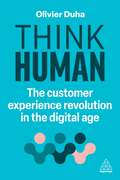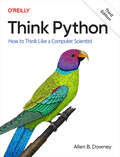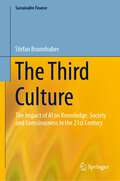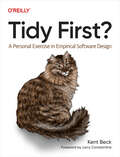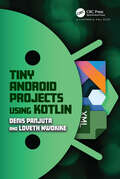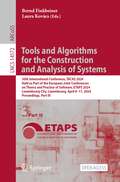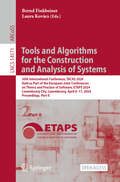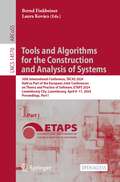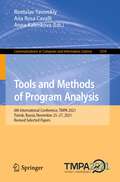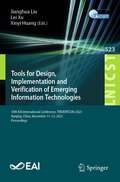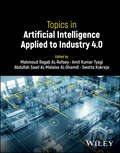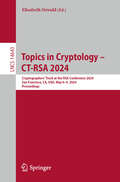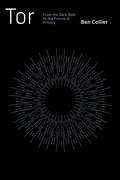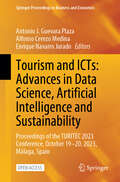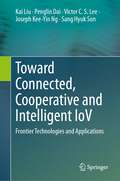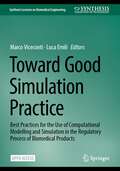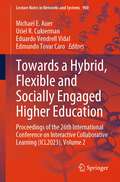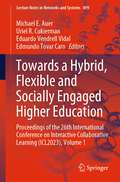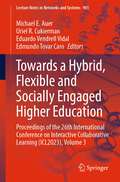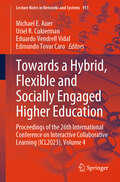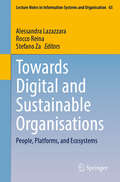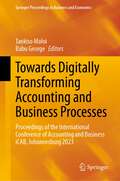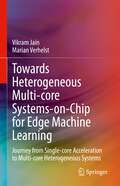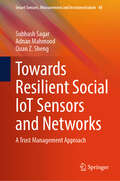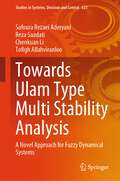- Table View
- List View
Think Human: The Customer Experience Revolution in the Digital Age
by Olivier DuhaIn an increasingly competitive and digitalized world where experience reins supreme, Olivier Duha highlights the radical evolution of customer relations and outlines six golden rules to maximize customer satisfaction.Advocating for the importance of the human factor assisted by technology in the digital age of customer relations, this book explores the impact of the digital revolution on brands, their shift from being product-focused to customer-focused and provides strategies for how brands can succeed in the battle for the customer. By developing customer relations teams that value the role of the human being augmented by technology, you can put technology at the service of humans and take control to create valuable customer experiences. Drawing on over two decades of experience developing Webhelp into a leading global provider of game-changing customer journeys, Duha shows you how to develop your customer relations team into a key strategic resource for growth.
Think Python: How To Think Like A Computer Scientist
by Allen B. DowneyPython is an excellent way to get started in programming, and this clear, concise guide walks you through Python a step at a time—beginning with basic programming concepts before moving on to functions, data structures, and object-oriented design. This revised third edition reflects the growing role of large language models (LLMs) in programming and includes exercises on effective LLM prompts, testing code, and debugging skills.With this popular hands-on guide at your side, you'll get:A grounding in the syntax and semantics of the Python languageA clear definition of each programming concept, with emphasis on clear vocabularyHow to work with variables, statements, functions, and data structures in a logical progressionTechniques for reading and writing files and databasesA solid understanding of objects, methods, and object-oriented programmingDebugging strategies for syntax, runtime, and semantic errorsAn introduction to recursion, interface design, data structures, and basic algorithmsHow to use LLMs—including effective prompts, testing code, and debuggingAnd more
The Third Culture: The Impact of AI on Knowledge, Society and Consciousness in the 21st Century (Sustainable Finance)
by Stefan BrunnhuberWe are currently witnessing the emergence of a ‘third culture’, driven by unprecedented developments that are changing the playing field. These include advances in AI, big data analysis and robotics. The traditional ‘two cultures’ view (S. P. Snow) distinguishes between the sciences and the humanities. The wisdoms these two cultures offer are separated from each other, with little to no interaction or mutual comprehension. However, over the past two decades, and for the first time in human history, a new, third culture has appeared. This new culture, rooted in new technologies, not only pursues its own form of rationality but also supports advances in the original two cultures, deepening and expanding our individual and collective consciousness so that we can see more and do better. It will eventually give rise to new forms of consciousness based not on biochemical signals, but on copper wires and lithium chips. These new machine intelligences will change the world and force us to realise: we are no longer alone. The human species’ position in the twenty-first century will be fundamentally redefined: not as a conductor leading the orchestra, but a single string player within it.
Tidy First?: A Personal Exercise In Empirical Software Design
by Kent BeckTidying up messy software is a must. And that means breaking up the code to make it more readable, and using guard clauses and helping functions to make it understandable. In this practical guide, author Kent Beck, creator of Extreme Programming and pioneer of software patterns, suggests when and where you might apply tidyings in your code.Instead of trying to master tidying all at once, this book lets you try out a few examples that make sense for your problem. If you have a big function containing many lines of code, you'll learn how to logically divide it into smaller chunks. Along the way, you'll learn the theory behind software design: coupling, cohesion, discounted cash flows, and optionality.
Tiny Android Projects Using Kotlin
by Denis Panjuta Loveth NwokikeIn today’s fast-paced world, Android development is a rapidly evolving field that requires regular updates to keep up with the latest trends and technologies. Tiny Android Projects Using Kotlin is an excellent resource for developers who want to learn to build Android applications using the latest tools and frameworks. KEY FEATURES • Teaches building Android apps using Kotlin, XML, and Jetpack Compose • Includes saving data on the device using the Room database library • Teaches communication between an Android device and data on the internet using REST API • Shows how to create different Android menu navigations using Jetpack Compose • Introduces the most architectures used in Android Projects and implements MVVM With Kotlin being the most preferred language for Android development, this book provides a practical, hands-on approach to learning the language and building high-quality Android apps using Kotlin, XML, and Jetpack Compose.
Tools and Algorithms for the Construction and Analysis of Systems: 30th International Conference, TACAS 2024, Held as Part of the European Joint Conferences on Theory and Practice of Software, ETAPS 2024, Luxembourg City, Luxembourg, April 6–11, 2024, Proceedings, Part III (Lecture Notes in Computer Science #14572)
by Bernd Finkbeiner Laura KovácsThe open access book 3-volume set LNCS 14570-14573 constitutes the proceedings of the 30th International Conference on Tools and Algorithms for the Construction and Analysis of Systems, TACAS 2024, which was held as part of the European Joint Conferences on Theory and Practice of Software, ETAPS 2024, during April 6-11, 2024, in Luxembourg.The 53 full papers and 16 short SVComp contributions included in these proceedings were carefully reviewed and selected from 159 submissions. They were organized in topical sections as follows:Part I: STA and SMT solving; synthesis; logic and decidability; program analysis and proofs; proof checking; Part II: Model Checking; automata and learning; software verification; probabilistic systems; simulations; Part III: Neural networks; testing and verification; games; concurrency; SV-Comp 2024.
Tools and Algorithms for the Construction and Analysis of Systems: 30th International Conference, TACAS 2024, Held as Part of the European Joint Conferences on Theory and Practice of Software, ETAPS 2024, Luxembourg City, Luxembourg, April 6–11, 2024, Proceedings, Part II (Lecture Notes in Computer Science #14571)
by Bernd Finkbeiner Laura KovácsThe open access book 3-volume set LNCS 14570-14573 constitutes the proceedings of the 30th International Conference on Tools and Algorithms for the Construction and Analysis of Systems, TACAS 2024, which was held as part of the European Joint Conferences on Theory and Practice of Software, ETAPS 2024, during April 6-11, 2024, in Luxembourg.The 53 full papers and 16 short SVComp contributions included in these proceedings were carefully reviewed and selected from 159 submissions. They were organized in topical sections as follows:Part I: STA and SMT solving; synthesis; logic and decidability; program analysis and proofs; proof checking; Part II: Model Checking; automata and learning; software verification; probabilistic systems; simulations; Part III: Neural networks; testing and verification; games; concurrency; SV-Comp 2024.
Tools and Algorithms for the Construction and Analysis of Systems: 30th International Conference, TACAS 2024, Held as Part of the European Joint Conferences on Theory and Practice of Software, ETAPS 2024, Luxembourg City, Luxembourg, April 6–11, 2024, Proceedings, Part I (Lecture Notes in Computer Science #14570)
by Bernd Finkbeiner Laura KovácsThe open access book 3-volume set LNCS 14570-14573 constitutes the proceedings of the 30th International Conference on Tools and Algorithms for the Construction and Analysis of Systems, TACAS 2024, which was held as part of the European Joint Conferences on Theory and Practice of Software, ETAPS 2024, during April 6-11, 2024, in Luxembourg.The 53 full papers and 16 short SVComp contributions included in these proceedings were carefully reviewed and selected from 159 submissions. They were organized in topical sections as follows:Part I: STA and SMT solving; synthesis; logic and decidability; program analysis and proofs; proof checking; Part II: Model Checking; automata and learning; software verification; probabilistic systems; simulations; Part III: Neural networks; testing and verification; games; concurrency; SV-Comp 2024.
Tools and Methods of Program Analysis: 6th International Conference, TMPA 2021, Tomsk, Russia, November 25–27, 2021, Revised Selected Papers (Communications in Computer and Information Science #1559)
by Rostislav Yavorskiy Ana Rosa Cavalli Anna KalenkovaThis book constitutes the refereed proceedings of the 6th International Conference on Tools and Methods of Program Analysis, TMPA 2021, held in Tomsk, Russia, during November 25–27, 2021.The 15 full papers and 3 short papers included in this book were carefully reviewed and selected from 45 submissions. They focus on various aspects of application of modern methods of data science to the analysis of software quality.
Tools for Design, Implementation and Verification of Emerging Information Technologies: 18th EAI International Conference, TRIDENTCOM 2023, Nanjing, China, November 11-13, 2023, Proceedings (Lecture Notes of the Institute for Computer Sciences, Social Informatics and Telecommunications Engineering #523)
by Jianghua Liu Lei Xu Xinyi HuangThis book constitutes the refereed post-conference proceedings of the 18th EAI International Conference on Tools for Design, Implementation and Verification of Emerging Information Technologies, TridentCom 2023, which was held in Nanjing, China, during November 11-13, 2023. The 9 full papers were selected from 30 submissions and deal the emerging technologies of big data, cyber-physical systems and computer communications. The papers are grouped in thematical sessions on blockchain and its applications; emerging applications; AI and its security.
Topics in Artificial Intelligence Applied to Industry 4.0
by Mahmoud Ragab AL-Refaey Amit Kumar Tyagi Abdullah Saad AL-Malaise Swetta KukrejaTopics in Artificial Intelligence Applied to Industry 4.0 Forward thinking resource discussing emerging AI and IoT technologies and how they are applied to Industry 4.0 Topics in Artificial Intelligence Applied to Industry 4.0 discusses the design principles, technologies, and applications of emerging AI and IoT solutions on Industry 4.0, explaining how to make improvements in infrastructure through emerging technologies. Providing a clear connection with different technologies such as IoT, Big Data, AR and VR, and Blockchain, this book presents security, privacy, trust, and other issues whilst delving into real-world problems and case studies. The text takes a highly practical approach, with a clear insight on how readers can increase productivity by drastically shortening the time period between the development of a new product and its delivery to customers in the market by 50%. This book also discusses how to save energy across systems to ensure competitiveness in a global market, and become more responsive in how they produce products and services for their consumers, such as by investing in flexible production lines. Written by highly qualified authors, Topics in Artificial Intelligence Applied to Industry 4.0 explores sample topics such as: Quantum machine learning, neural network implementation, and cloud and data analytics for effective analysis of industrial data Computer vision, emerging networking technologies, industrial data spaces, and an industry vision for 2030 in both developing and developed nations Novel or improved nature-inspired optimization algorithms in enhancing Industry 5.0 and the connectivity of any components for smart environment Future professions in agriculture, medicine, education, fitness, R&D, and transport and communication as a result of new technologies Aimed at researchers and students in the interdisciplinary fields of Smart Manufacturing and Smart Applications, Topics in Artificial Intelligence Applied to Industry 4.0 provides the perfect overview of technology from the perspective of modern society and operational environment.
Topics in Cryptology – CT-RSA 2024: Cryptographers’ Track at the RSA Conference 2024, San Francisco, CA, USA, May 6–9, 2024, Proceedings (Lecture Notes in Computer Science #14643)
by Elisabeth OswaldThis book constitutes the refereed proceedings of the Cryptographer's Track at the RSA Conference 2024, CT-RSA 2024, held in San Francisco, CA, USA, during May 6–9, 2024. The 18 full papers presented in this volume were carefully reviewed and selected from 46 submissions. The conference presents papers on subjects such as public key cryptography; symmetric cryptography; signatures; homomorphic encryption; identity-based encryption; constructions; and threshold signatures and fault attacks.
Tor: From the Dark Web to the Future of Privacy
by Ben CollierA biography of Tor—a cultural and technological history of power, privacy, and global politics at the internet's core.Tor, one of the most important and misunderstood technologies of the digital age, is best known as the infrastructure underpinning the so-called Dark Web. But the real &“dark web,&” when it comes to Tor, is the hidden history brought to light in this book: where this complex and contested infrastructure came from, why it exists, and how it connects with global power in intricate and intimate ways. In Tor: From the Dark Web to the Future of Privacy, Ben Collier has written, in essence, a biography of Tor—a cultural and technological history of power, privacy, politics, and empire in the deepest reaches of the internet.The story of Tor begins in the 1990s with its creation by the US Navy&’s Naval Research Lab, from a convergence of different cultural worlds. Drawing on in-depth interviews with designers, developers, activists, and users, along with twenty years of mailing lists, design documents, reporting, and legal papers, Collier traces Tor&’s evolution from those early days to its current operation on the frontlines of global digital power—including the strange collaboration between US military scientists and a group of freewheeling hackers called the Cypherpunks. As Collier charts the rise and fall of three different cultures in Tor&’s diverse community—the engineers, the maintainers, and the activists, each with a distinct understanding of and vision for Tor—he reckons with Tor&’s complicated, changing relationship with contemporary US empire. Ultimately, the book reveals how different groups of users have repurposed Tor and built new technologies and worlds of their own around it, with profound implications for the future of the Internet.
Tourism and ICTs: Proceedings of the TURITEC 2023 Conference, October 19–20, 2023, Málaga, Spain (Springer Proceedings in Business and Economics)
by Antonio J. Guevara Plaza Alfonso Cerezo Medina Enrique Navarro JuradoThis open-access book presents the best research papers from the XIV International Congress on Tourism and Information and Communications Technologies (TURITEC2023), held in Málaga, Spain from 19 to 20 October 2023. The book explores the profound impact of COVID-19 on the tourism industry and the increasing importance of digitalization and Information and Communication Technologies (ICTs) as key drivers for the industry's recovery, alongside sustainability. This curated collection of research papers offers conceptualizations, methodologies, analyses, and empirical case studies that illuminate the path to a resilient and sustainable future for tourism.
Toward Connected, Cooperative and Intelligent IoV: Frontier Technologies and Applications
by Kai Liu Penglin Dai Victor C.S. Lee Joseph Kee-Yin Ng Sang Hyuk SonThis book offers a comprehensive introduction to technological advances in Internet of Vehicles (IoV), including vehicular communications, vehicular system architectures, data dissemination algorithms, resource allocation schemes, and AI-enabled applications. It focuses on the state-of-the-art IoV with regard to three major directions, namely networking, cooperation, and intelligence, including advanced wireless communication technologies, algorithm theory, optimization mechanisms, and AI technologies. In addition, the book includes a number of case studies with system prototype implementation and hands-on experiments in IoV, making it suitable both as a technical reference work for professionals and as a textbook for graduate students.
Toward Good Simulation Practice: Best Practices for the Use of Computational Modelling and Simulation in the Regulatory Process of Biomedical Products (Synthesis Lectures on Biomedical Engineering)
by Marco Viceconti Luca EmiliThis open access book, the Community of Practice led by the VPH Institute, the Avicenna Alliance, and the In Silico World consortium has brought together 138 experts in In Silico Trials working in academia, the medical industry, regulatory bodies, hospitals, and consulting firms. Through a consensus process, these experts produced the first attempt to define some Good Simulation Practices on how to develop, evaluate, and use In Silico Trials. Good Simulation Practice constitutes an indispensable guide for anyone who is planning to engage at any title with In Silico Trials.
Towards a Hybrid, Flexible and Socially Engaged Higher Education: Proceedings of the 26th International Conference on Interactive Collaborative Learning (ICL2023), Volume 2 (Lecture Notes in Networks and Systems #900)
by Michael E. Auer Uriel R. Cukierman Eduardo Vendrell Vidal Edmundo Tovar CaroThis book contains papers in the fields of educational virtual environments, future of education, project-based learning (PBL), and digital education strategy and engineering pedagogy. The authors currently witnessing a significant transformation in the development of education on all levels and especially in post-secondary education. To face these challenges, higher education must find innovative and effective ways to respond in a proper way. The pandemic period left us with profound changes in the way we teach and learn, including the massive use of new means of communication, such as videoconferencing and other technological tools. Moreover, the current explosion of artificial intelligence tools, mainly used by students, is challenging teaching practices maintained for centuries. Scientifically based statements as well as excellent best practice examples are absolutely necessary. The 26th International Conference on Interactive Collaborative Learning (ICL2023), which took place in Madrid, Spain, between September 26 and 30, 2023, was the perfect place where current trends in higher education were presented and discussed. Since its beginning in 1998, this conference has been devoted to new approaches in learning with a focus on collaborative learning in higher education. Nowadays, the ICL conferences are a forum of the exchange of relevant trends and research results as well as the presentation of practical experiences in learning and engineering pedagogy. In this way, the authors try to bridge the gap between ‘pure’ scientific research and the everyday work of educators. Interested readership includes policy makers, academics, educators, researchers in pedagogy and learning theory, schoolteachers, learning industry, further and continuing education lecturers, etc.
Towards a Hybrid, Flexible and Socially Engaged Higher Education: Proceedings of the 26th International Conference on Interactive Collaborative Learning (ICL2023), Volume 1 (Lecture Notes in Networks and Systems #899)
by Michael E. Auer Uriel R. Cukierman Eduardo Vendrell Vidal Edmundo Tovar CaroThis book contains papers in the fields of collaborative learning, digital transition in education, and AI and learning analytics in engineering education. The authors are currently witnessing a significant transformation in the development of education on all levels and especially in post-secondary education. To face these challenges, higher education must find innovative and effective ways to respond in a proper way. The pandemic period left us with profound changes in the way we teach and learn, including the massive use of new means of communication, such as videoconferencing and other technological tools. Moreover, the current explosion of artificial intelligence tools, mainly used by students, is challenging teaching practices maintained for centuries. Scientifically based statements as well as excellent best practice examples are absolutely necessary. The 26th International Conference on Interactive Collaborative Learning (ICL2023), which took place in Madrid, Spain, between September 26 and 30, 2023, was the perfect place where current trends in higher education were presented and discussed. Since its beginning in 1998, this conference has been devoted to new approaches in learning with a focus on collaborative learning in higher education. Nowadays, the ICL conferences are a forum of the exchange of relevant trends and research results as well as the presentation of practical experiences in learning and engineering pedagogy. In this way, the authors try to bridge the gap between ‘pure’ scientific research and the everyday work of educators. Interested readership includes policy makers, academics, educators, researchers in pedagogy and learning theory, schoolteachers, learning industry, further and continuing education lecturers, etc.
Towards a Hybrid, Flexible and Socially Engaged Higher Education: Proceedings of the 26th International Conference on Interactive Collaborative Learning (ICL2023), Volume 3 (Lecture Notes in Networks and Systems #901)
by Michael E. Auer Uriel R. Cukierman Eduardo Vendrell Vidal Edmundo Tovar CaroThis book contains papers in the fields of engineering pedagogy education, research in engineering pedagogy, and games in engineering education. The authors are currently witnessing a significant transformation in the development of education on all levels and especially in post-secondary education. To face these challenges, higher education must find innovative and effective ways to respond in a proper way. The pandemic period left us with profound changes in the way we teach and learn, including the massive use of new means of communication, such as videoconferencing and other technological tools. Moreover, the current explosion of artificial intelligence tools, mainly used by students, is challenging teaching practices maintained for centuries. Scientifically based statements as well as excellent best practice examples are absolutely necessary. The 26th International Conference on Interactive Collaborative Learning (ICL2023), which took place in Madrid, Spain, between September 26 and 30, 2023, was the perfect place where current trends in higher education were presented and discussed. Since its beginning in 1998, this conference has been devoted to new approaches in learning with a focus on collaborative learning in higher education. Nowadays, the ICL conferences are a forum of the exchange of relevant trends and research results as well as the presentation of practical experiences in learning and engineering pedagogy. In this way, the authors try to bridge the gap between ‘pure’ scientific research and the everyday work of educators. Interested readership includes policy makers, academics, educators, researchers in pedagogy and learning theory, schoolteachers, learning industry, further and continuing education lecturers, etc.
Towards a Hybrid, Flexible and Socially Engaged Higher Education: Proceedings of the 26th International Conference on Interactive Collaborative Learning (ICL2023), Volume 4 (Lecture Notes in Networks and Systems #911)
by Michael E. Auer Uriel R. Cukierman Eduardo Vendrell Vidal Edmundo Tovar CaroWe are currently witnessing a significant transformation in the development of education on all levels and especially in post-secondary education. To face these challenges, higher education must find innovative and effective ways to respond in a proper way. The pandemic period left us with profound changes in the way we teach and learn, including the massive use of new means of communication, such as videoconferencing and other technological tools. Moreover, the current explosion of artificial intelligence tools, mainly used by students, is challenging teaching practices maintained for centuries. Scientifically based statements as well as excellent best practice examples are absolutely necessary.The 26th International Conference on Interactive Collaborative Learning (ICL2023), which will take place in Madrid, Spain, between 26th and 30th September 2023, will be the perfect place where to present and discuss current trends in Higher Education.Since its beginning in 1998 this conference is devoted to new approaches in learning with a focus on collaborative learning in Higher Education. Nowadays the ICL conferences are a forum of the exchange of relevant trends and research results as well as the presentation of practical experiences in Learning and Engineering Pedagogy. In this way we try to bridge the gap between ‘pure’ scientific research and the everyday work of educators.
Towards Digital and Sustainable Organisations: People, Platforms, and Ecosystems (Lecture Notes in Information Systems and Organisation #65)
by Stefano Za Alessandra Lazazzara Rocco ReinaThis book presents a collection of research papers that explore how ICT experts, managers, and policymakers can address sustainability issues in digital transformation (DT) by considering people practices, organizational processes, and platform design issues. Each chapter offers insights into how to create sustainable digital solutions that benefit both society and the environment. The diversity of views presented makes this book particularly relevant for scholars, companies, and public sector organizations. The content is based on revised versions of selected papers (original double-blind peer-reviewed contributions) presented at the annual conference of the Italian Chapter of AIS, which took place in Catanzaro, Italy, in October 2022.
Towards Digitally Transforming Accounting and Business Processes: Proceedings of the International Conference of Accounting and Business iCAB, Johannesburg 2023 (Springer Proceedings in Business and Economics)
by Tankiso Moloi Babu GeorgeThis conference volume discusses the findings of the iCAB 2023 conference that took place in Johannesburg, South Africa. The University of Johannesburg (UJ School of Accounting and Johannesburg Business School) in collaboration with Alcorn State University (USA), Salem State University (USA) and Universiti Teknologi Mara (Malaysia) hosted the iCAB 2023 conference with the aim to bring together researchers from different Accounting and Business Management fields to share ideas and discuss how new disruptive technological developments are impacting the field of accounting. The conference was sponsored by the Association of International Certified Professional Accountants AICPA & CIMA.
Towards Heterogeneous Multi-core Systems-on-Chip for Edge Machine Learning: Journey from Single-core Acceleration to Multi-core Heterogeneous Systems
by Vikram Jain Marian VerhelstThis book explores and motivates the need for building homogeneous and heterogeneous multi-core systems for machine learning to enable flexibility and energy-efficiency. Coverage focuses on a key aspect of the challenges of (extreme-)edge-computing, i.e., design of energy-efficient and flexible hardware architectures, and hardware-software co-optimization strategies to enable early design space exploration of hardware architectures. The authors investigate possible design solutions for building single-core specialized hardware accelerators for machine learning and motivates the need for building homogeneous and heterogeneous multi-core systems to enable flexibility and energy-efficiency. The advantages of scaling to heterogeneous multi-core systems are shown through the implementation of multiple test chips and architectural optimizations.
Towards Resilient Social IoT Sensors and Networks: A Trust Management Approach (Smart Sensors, Measurement and Instrumentation #48)
by Quan Z. Sheng Adnan Mahmood Subhash SagarThis book, at first, explores the evolution of the IoT to SIoT and offers a comprehensive understanding of SIoT and trust management vis-à-vis SIoT. It subsequently envisages trust quantification models by employing key SIoT-specific trust features, including SIoT relationships (e.g., friendships, working relationships, and community-of-interest), direct observations, and indirect observations, to augment the idea of trust quantification of a SIoT object. Furthermore, diverse trust aggregation techniques, i.e., conventional weighted sum, machine learning, and artificial neural networks, are proposed so as to address the challenges of the trust aggregation. Finally, the book outlines the future research directions for emphasizing the importance of trustworthiness management in the evolving notion of the SIoT.
Towards Ulam Type Multi Stability Analysis: A Novel Approach for Fuzzy Dynamical Systems (Studies in Systems, Decision and Control #523)
by Reza Saadati Tofigh Allahviranloo Safoura Rezaei Aderyani Chenkuan LiThe main target of this book is to present a new concept of Ulam-type stability, i.e., multi-stability, through the classical, well-known special functions and to obtain the best approximation error estimates by a different concept of perturbation stability including fuzzy approaches for uncertainty considerations. This stability allows us to obtain diverse approximations depending on various special functions that are initially chosen and to evaluate maximal stability and minimal error which enable us to obtain a unique optimal solution of functional equations, inequalities, and fractional equations. Stability analysis in the sense of the Ulam and its different kinds has received considerable attention from the researchers. However, how to effectively generalize the Ulam stability problems and to evaluate optimized controllability and stability are new issues. The multi-stability not only covers the previous concepts but also considers the optimization of the problem and provides a comprehensive discussion of optimizing the different types of the Ulam stabilities of mathematical models used in the natural sciences and engineering disciplines with fuzzy attitudes. Besides, this book also deals with nonlinear differential equations with various boundary conditions or initial value problems, based on the matrix Mittag-Leffler function, fixed point theory, as well as Babenko's approach to study uniqueness and existence of solutions. In general, the benefits for the readers can be concluded as follows: 1. Evaluates maximal stability with minimal error to get a unique optimal solution. 2. Discusses an optimal method of the alternative to study existence, uniqueness, and different types of Ulam stabilities under special consideration of the fuzzy approaches. 3. Delves into the new study of boundary value problems of fractional integro-differential equations with integral boundary conditions and variable coefficients.
